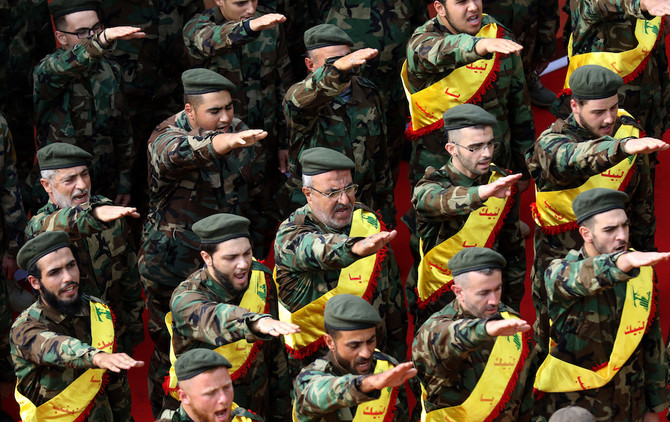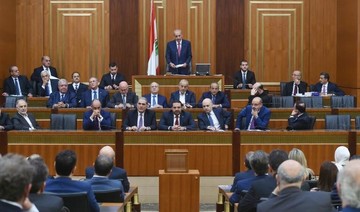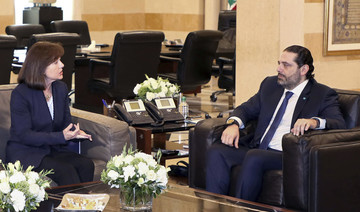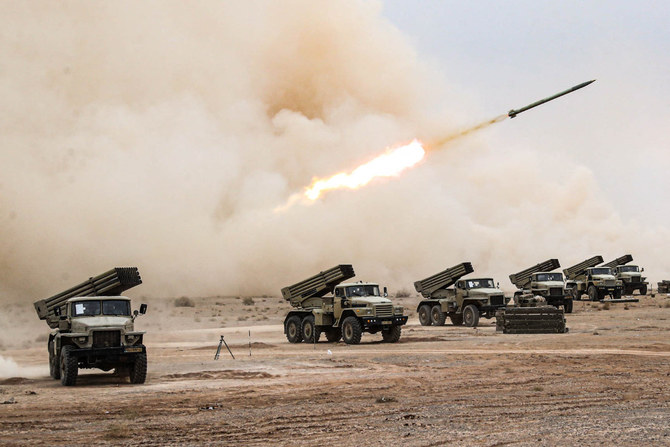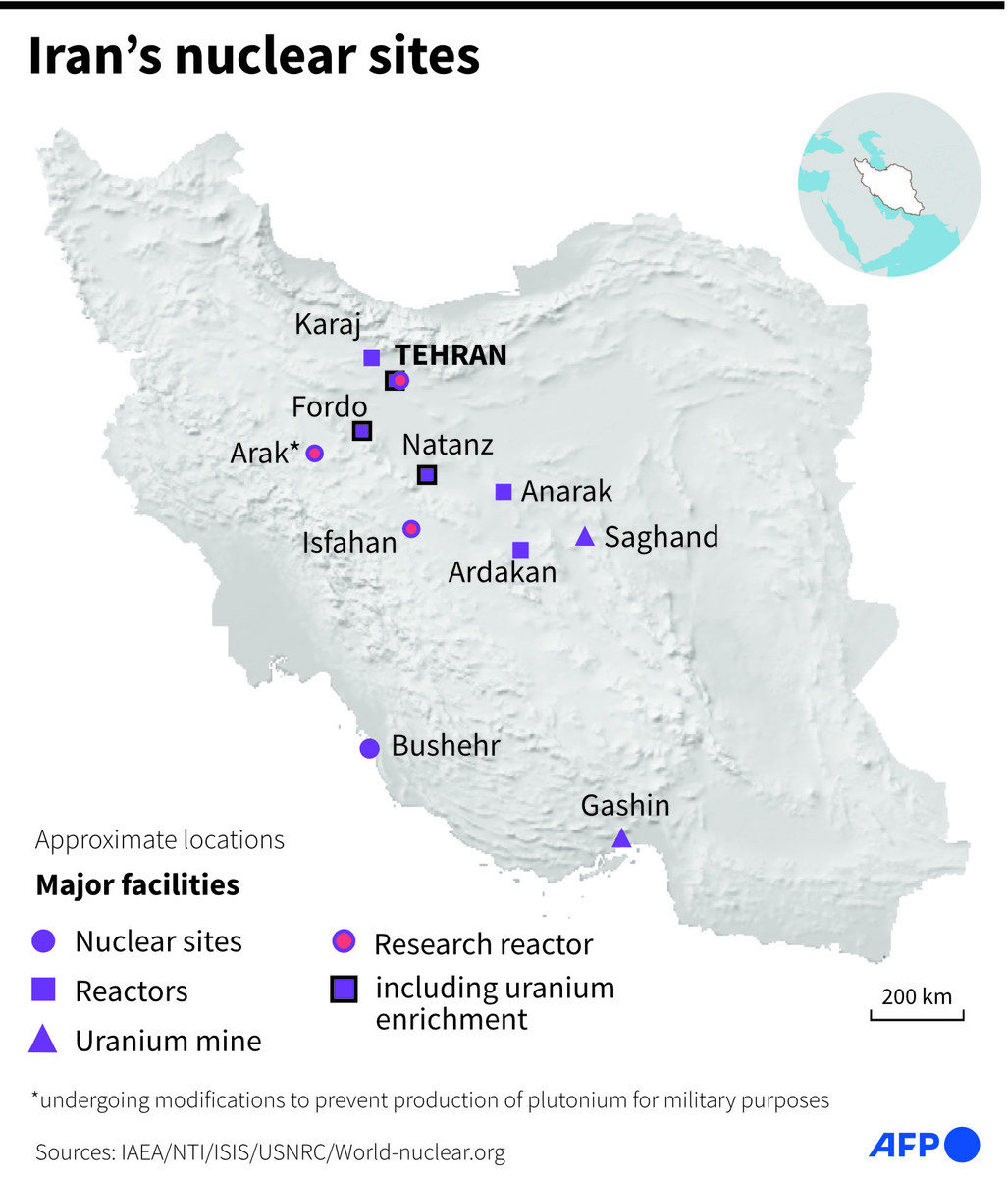LONDON: The UK is to ban Hezbollah in its entirety for threatening stability in the Middle East and posing a threat to Britain’s national security.
The proscription will make membership of the movement or inviting support for it a crime punishable by up to 10 years’ imprisonment, ministers said on Monday.
Hezbollah’s military wing is currently banned in the UK — but the government said it is no longer possible to separate the political arm, which is based in Lebanon and supported by Iran, from the rest of the organization.
From Friday, the group will be banned in its entirety as a “terrorist organization,” following repeated calls from campaigners and outrage over the display of the Hezbollah flag, which features a Kalashnikov assault rifle, at demonstrations in London.
Today I’ve announced the banning of three groups - including Hizballah. We will continue to outlaw terrorist organisations that threaten our safety & securityhttps://t.co/KMuYXmmu39
— Sajid Javid (@sajidjavid) February 25, 2019
“We identify and ban any terrorist organization which threatens our safety and security, whatever their motivations or ideology which is why I am taking action against several organizations today,” Home Secretary Sajid Javid said.
“Hezbollah is continuing in its attempts to destabilize the fragile situation in the Middle East — and we are no longer able to distinguish between their already banned military wing and the political party. Because of this, I have taken the decision to proscribe the group in its entirety.”
The ban is subject to a vote in the UK Parliament this week.
Hezbollah’s External Security Organization and its military wing including the Jihad Council were proscribed by the UK in 2001 and 2008, respectively.
The Shiite militant movement was established in 1982 during the Lebanese civil war, and the group is now a major political party in Lebanon. Its capture in 2006 of two Israeli soldiers sparked Israel’s 2006 war with Lebanon, in which 1,200 people were killed.
Foreign Secretary Jeremy Hunt said in Monday’s statement that the move to blacklist Hezbollah did not change the UK’s commitment to Lebanon.
We cannot and will not turn a blind eye to Hizballah’s terrorist activities. So today we have announced they will be proscribed in full by the UK govt. This decision does not change our staunch support for Lebanon, nor our strong and broad relationship with the Lebanese people https://t.co/emDyZFfBAl
— Jeremy Hunt (@Jeremy_Hunt) February 25, 2019
“We are staunch supporters of a stable and prosperous Lebanon. We cannot however be complacent when it comes to terrorism — it is clear the distinction between Hezbollah’s military and political wings does not exist, and by proscribing Hezbollah in all its forms, the government is sending a clear signal that its destabilising activities in the region are totally unacceptable and detrimental to the UK’s national security,” Hunt said.
“This does not change our ongoing commitment to Lebanon, with whom we have a broad and strong relationship.”
Matthew Levitt, an expert on Hezbollah and counter-terror at the Washington Institute for Near East Policy, said there are people in the UK affiliated with Hezbollah but who are not believed to be members of the military wings who could now be targeted by the authorities.
He said traditionally they were linked to the group’s Foreign Relations Department working as ambassadors, money raisers, or dealing with logistics. But as Hezbollah became more embroiled in the Syrian war, the group has increasingly relied on the FRD for operational purposes.
“Now anybody who is doing things on behalf of Hezbollah and certainly those affiliated with Hezbollah’s FRD would be well within the crosshairs of Hezbollah’s proscription,” Levitt said.
He added that even Hezbollah itself has said there is little differentiation between its political and military wings and that it is a unified organization dedicated to political violence.
The London-based Tony Blair Institute for Global Change said it welcomed the move by the UK but said more unified action is required against Hezbollah internationally.
Hezbollah, which is mainly financed by Iranian backers, is already considered a terror group by the US, Canada, Israel and the Arab League.
We welcome the Home Office's decision to proscribe Hezbollah in the UK but the international community must take unified steps to ban Hezbollah in its entirety.
Watch TBI's @AzminaSiddique set out why action is needed now ↓ pic.twitter.com/nDlIvHyPnF
— Tony Blair Institute (@InstituteGC) February 25, 2019
“Hezbollah remains one of the most capable terrorist organizations in the world,” said Azmina Siddique, a policy adviser at the institute.
“It has been responsible for countless terrorist attacks and it intends to continue expanding its reach.
“Iran funds Hezbollah by up to $200 million a year but financial pressure on Iran from the renewed US sanctions are likely to make Hezbollah ramp up its international funding activities including drugs trafficking and smuggling through the EU and the UK.”
Ghanem Nuseibeh, founder of Cornerstone Global, a management consultancy focused on the Middle East, said the UK government was sending a message that it will not be “a safe haven” to terror groups.
“This shows that the UK government proactively updates its list of proscribed organizations, based on new evidence and new threats,” Nuseibeh told Arab News.
“It also shows that the UK government believes the interconnectedness of terrorist groups like Hezbollah, across the world, threatens UK security. The message that the UK government has is that groups that pose a terrorist threat in the Middle East are also a threat to the UK.”
Former Government minister Eric Pickles, now the UK’s Special Envoy for post-Holocaust issues, tweeted an image of the order proscribing Hezbollah. “No one in the UK with any sense of responsibility would call them our ‘friends’,” he added.
This is the Order that prescribes the whole of Hizballah. The Government joins other countries in recognising that there is no real difference between the military and political wings of Hizballah.
No one in the UK with any sense of responsibility would call them our ”friends” pic.twitter.com/90TYv2Xe5Q
— Eric Pickles (@EricPickles) February 25, 2019
Israel welcomed the UK’s and called for the United Nations to follow suit.
The UK government is also banning Ansarul Islam, an extremist group which emerged near the border between Mali and Burkina Faso in 2016, and the Group to Support Islam and Muslims (JNIM), which has sworn allegiance to Al-Qaeda in the Islamic Maghreb.
Britain currently has 74 international terrorist organizations proscribed under the Terrorism Act 2000.


